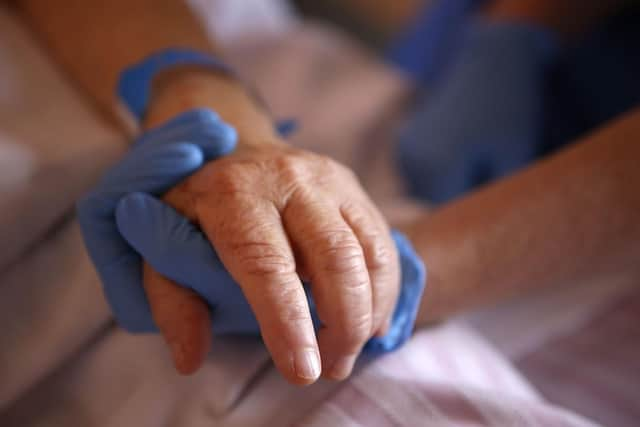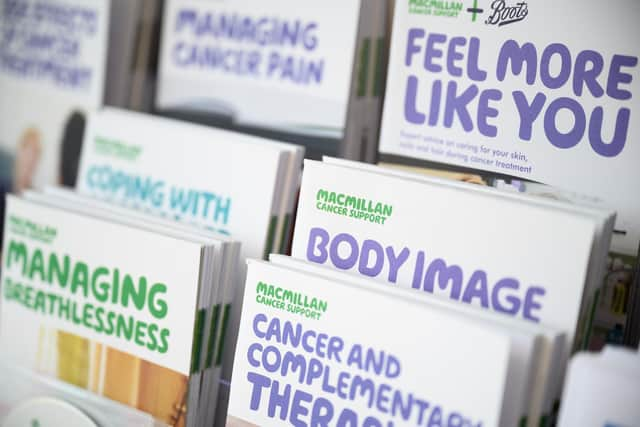NHS crisis Scotland: Fewer Scots will be able to choose where they die due to NHS staff shortages, warns cancer charity
Dying at home is considered by many to be the gold standard for how they wish to pass on but, although cancer deaths in Scotland are set to jump by more than a quarter in the coming decades, there is still no end of life strategy for Scots.
“It’s not a popular topic,” explained Macmillan Cancer Support Scotland’s Kate Seymour, “however, with cancer deaths expected to increase by 29 per cent between 2017 and 2035, and no end of life strategy currently in place, Macmillan wants more urgency to ensure people in Scotland have the best possible death.”
Advertisement
Hide AdAdvertisement
Hide Ad“Along with other charities, Macmillan Cancer Support has long campaigned for people to be able to die in a place of their choosing. Poll after poll shows that for most people this is their home.


“The fact we’ve seen a rapid increase in deaths at home, rather than hospital, means we should be feeling positive about this, however unfortunately we’re not.”
The reason for this, said Ms Seymour, is that, during the pandemic, people were fearful of going into hospitals and care homes “so lots more people died in their home”.
“We know most people say they’d prefer to die at home given the choice but we need to ensure that they receive the right care and support for this to be a good experience,” she said.
“Providing the care to support a ‘good death’ at home is challenging and requires a joined up and fully resourced workforce.”


In November, the Scottish Government set up the Palliative and End of Life Care Strategy Steering Group, to oversee the development and delivery of a new palliative and end of life care strategy and associated work programmes.
The group will be chaired by the National Clinical Lead for Palliative Care – Kirsty Boyd, Reader in Palliative Care, University of Edinburgh – and will report to the Minister for Public Health and Women’s Health Jenni Minto.
As part of this work, the Scottish Government said the strategy steering group will ensure everyone in Scotland “receives well-coordinated, timely and high-quality palliative care, care around death and bereavement support based on their needs and preferences including support for families and carers”.
Advertisement
Hide AdAdvertisement
Hide AdThe strategy groups also aims to make Scotland “a place where people and communities can come together to support each other, take action, and talk openly about planning ahead, serious illness, dying, death, and bereavement”.
Ms Seymour said there is “an opportunity” with the forthcoming strategy “to deliver the resources, strategic direction and vision to achieve this within our communities, but this requires investment and prioritisation of improving palliative and end of life care services within the NHS”.
“The Palliative Care Strategy must ensure that everyone who would benefit from palliative and end of life care is identified early and offered high quality care which is tailored to their personal needs,” she said.
“We also want to see everyone receiving personalised care at end of life through shared decision making and future care planning.
“Finally, Health Boards must deliver integrated, coordinated and personalised palliative and end of life care to people when and where they need it.”
Scottish Liberal Democrat MSP Liam McArthur, who has been developing an assisted dying bill, said the strategy “must ensure that all of those who would benefit from palliative and end of life care are swiftly identified” and called for a “comprehensive package of care that supports them and their loved ones” to be delivered.
“In particular, Scottish Liberal Democrats have been long term supporters of allowing people to choose to die in their own homes wherever possible so measures to support this goal would certainly be welcomed,” said Mr McArthur.
The proposed Assisted Dying for Terminally Ill Adults (Scotland) Bill would “enable competent adults who are terminally ill to be provided at their request with assistance to end their life”.
Advertisement
Hide AdAdvertisement
Hide AdIt would be available to people aged 16 and over, with a prognosis of no longer than six months to live, deemed to be of competent mind and able to administer and ingest the medication themselves.
MSPs will be given a free vote on the assisted dying legislation, meaning they do not need to vote in line with their party and there will be no whip applied.
“Throughout the process of developing my assisted dying bill, I have been clear that the option of an assisted death is not a substitute for excellent palliative care services,” Mr McArthur said.
“The evidence from around the world suggests that many of the nations and regions which offer the choice of an assisted death are also those which are committed to offering excellent palliative care alongside that choice.
“I hope that as parliament moves to pass my bill, it will also recommit itself to driving forward both standards of and access to excellent palliative and end of life care in Scotland.”
Scottish Labour’s health spokesperson Jackie Baillie said palliative care “has been neglected for too long”.
“We need a palliative care system that can truly meet the needs of patients,” said Dame Baillie.
“Wherever possible, people should have the option of dying at home – but far too many people don’t get to make that choice, with health inequalities impacting on end of life care.
Advertisement
Hide AdAdvertisement
Hide Ad“Community health and social care services are under immense pressure, which is making it more and more difficult for patients to get the support they need at home.
“Palliative care has been neglected for too long – the SNP must use the upcoming Palliative Care Strategy to deliver meaningful change, so everyone, whatever their background, can get the highest standard of care whether they choose to die in hospital or at home.”
Meanwhile, the Royal College of Radiologists (RCR) has already warned that all four UK nations are facing “chronic staff shortages”, with patients waiting too long for vital tests and treatments.
NHS services across the whole UK have been struggling to meet cancer targets since well before Covid, but the pandemic has aggravated the issue by increasing the backlog of scans and treatments.
Across England, Scotland and Northern Ireland, one key target is to start treatment within two months of an urgent referral by a GP.
In Wales the measure is slightly different as it includes all urgent and non-urgent referrals.
All four nations are operating well below those levels, according to NHS data.
Treatment for cancer has improved remarkably over the past few decades, but new, more effective techniques are also more complex for doctors to deliver.
Advertisement
Hide AdAdvertisement
Hide AdThe demographic of the UK is getting older too, meaning more and more people are developing cancer. That means more demand for scans, along with more staff to analyse results and more cancer specialist doctors and nurses, in the midst of a recruitment and retention crisis.
The RCR says for each month a patient waits to start cancer treatment, the risk of death is increased by about 10 per cent.
In its annual survey, 44 per cent of cancer service managers say they are now “highly concerned” about patient delays, up from 29 per cent in the previous year.
“There are examples in almost every cancer centre where parts of the service just aren’t running as well as we would like,” said Dr Tom Roques, a consultant oncologist and vice-president of the RCR.
“We’re having to tell patients all the time that we can’t quite treat them as quickly as we would like, or in the way that we’d like, and that’s a stressful thing to have to do.”
The lack of staffing in cancer care could lead to fewer people being able to choose how and where they wish to die.
“Providing on-hand care and support to dying people and their loved ones to manage pain and control symptoms over the course of weeks and days is essential,” said Ms Seymour. “For years, the main barrier to supporting people to die at home rather than in hospital was the limited support available from health and social care services.
“The limited number of trained staff, specialist equipment and difficulties in ensuring rapid access to effective pain relief, were all obstacles that sometimes seemed insurmountable.”
The pandemic only made matter worse, said Ms Seymour.
Advertisement
Hide AdAdvertisement
Hide Ad“Community health and social care services were not given extra resources during the pandemic to support this increase in people dying at home and this will have had a huge impact on those who were bereaved, particularly if they are left with memories of a difficult death,” she said.
“If we are to facilitate more people dying at home, we need to learn the lessons from the pandemic and ensure that the right levels of workforce and resources are in place in order to support people to have a good experience at end of life.
“Anyone facing the end of their life should be assured that whether they decide to die at home or hospital, the choice is theirs, and they’ll receive all the care and support they need.
“Everyone deserves the best possible death, free from as much pain, worry and uncertainty as possible.”
Comments
Want to join the conversation? Please or to comment on this article.